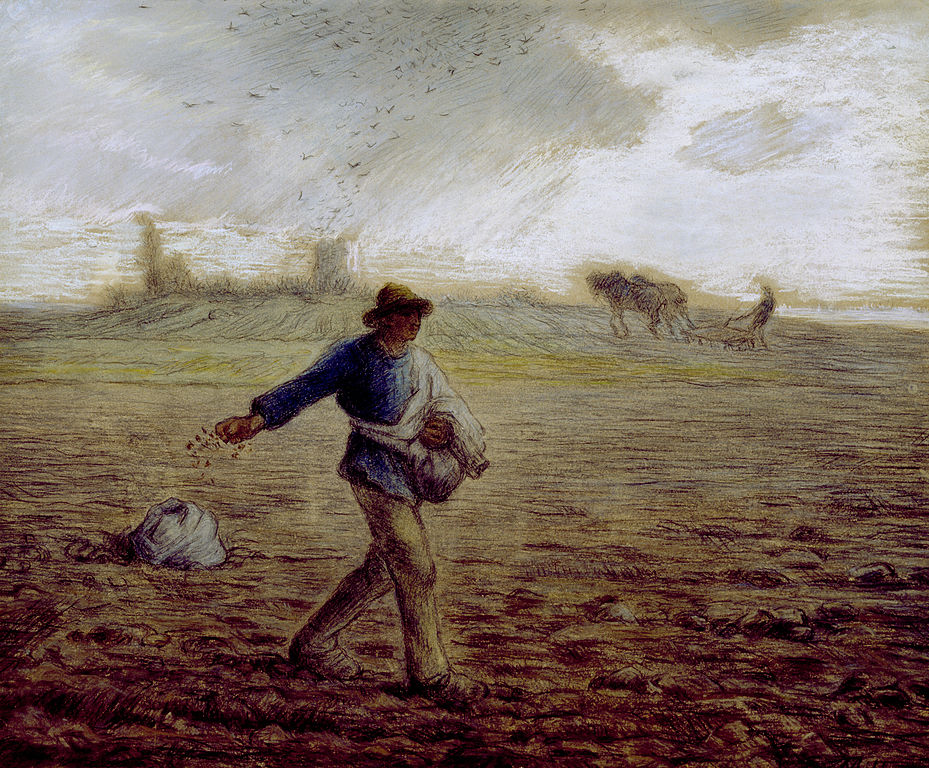The kingdom grows as God and man work together.
In Mark’s fourth chapter Jesus begins “to teach beside the sea” by way of four parables, including this:
The kingdom of God is as if a man should scatter seed on the ground. He sleeps and rises night and day, and the seed sprouts and grows; he knows not how. The earth produces by itself, first the blade, then the ear, then the full grain in the ear. But when the grain is ripe, at once he puts in the sickle, because the harvest has come. Mar 4:26-29 ESV
God and man work together
 Here’s one takeaway from Jesus’ parable: The kingdom grows as God and man work together. Man cannot do what only God can do, God will not do what the man can do.
Here’s one takeaway from Jesus’ parable: The kingdom grows as God and man work together. Man cannot do what only God can do, God will not do what the man can do.
The man scatters the seed and brings in the harvest. God causes the seed to grow. That is, He built into the dirt the capacity to grow seed into grain. The man is ignorant about how this happens. (Two millennia later we know a lot more but much of it remains a mystery.) The divine and the human participate together in the growth of the kingdom (which is the point of the parable). Some things only God can do. Anything the man can do, God defers to him.
Incomplete creation
Here’s another application of that truth: at the beginning, God created perfectly but not completely. The creation was perfect (flawless) even though it was not complete. It was flawless: nothing but perfection was to be found, no stain on its purity. Being the creation of a perfect Creator, it would necessarily be flawless. At some point later it would be marred by sin. But at the beginning “it was very good.”
Yet it was not complete. It was entirely flawless, but not perfectly complete. Just as the Creator intended. Completion of the creation would be the job of the human. This is sometimes called the Creation Mandate. God will not do what the man can do.
God spoke to the human, “Be fruitful and multiply, fill the earth and subdue it” (Gen 1:28). About the human, the text says “Then the LORD God took the man and put him into the garden of Eden to cultivate it and keep it” Gen 2:15 NAU. That word “cultivate” is closely related to “culture.” In fact, here’s Webster’s 1828 definition of culture:
CULTURE, noun [Latin See Cultivate.]
-
The act of tilling and preparing the earth for crops; cultivation; the application of labor or other means of improvement.
We ought to blame the culture not the soil.
-
The application of labor or other means to improve good qualities in, or growth; as the culture of the mind; the culture of virtue.
-
The application of labor or other means in producing; as the culture of corn, or grass.
-
Any labor or means employed for improvement, correction or growth.
CULTURE, verb transitive To cultivate.
God could have completed the creation, but He didn’t. He planted a garden and turned it over to Adam and Eve. He didn’t create 3,000 varieties of roses. Didn’t invent a hoe. Didn’t make a plow, design mud boots, build a greenhouse, fashion a tractor. Nor did He carve a flute, drill a well, craft a boat, or engineer a jet airplane. He enabled all those things (John 15:5). He envisioned them, He who knows all things exhaustively and completely, past, present and future (Isa. 41:21-26; 44:7; Heb. 4:13). Nothing lies outside the scope of God’s knowledge, but much that was in His foreknowledge did not appear in the ex nihilo creation. Only God can create out of nothing. But He designed the human as a secondary “creator” to fashion culture from the primary creation He had provided. The kingdom grows as God and man work together. The Creator will not do what the man can do; the man cannot do what only God can do.
Incomplete love
We see this in Genesis. And that’s not the only place in the redemptive story this truth appears. Late in the biblical canon, the apostle John writes about love,
Beloved, let us love one another, for love is from God, and whoever loves has been born of God and knows God. Anyone who does not love does not know God, because God is love. In this the love of God was made manifest among us, that God sent his only Son into the world, so that we might live through him. In this is love, not that we have loved God but that he loved us and sent his Son to be the propitiation for our sins. Beloved, if God so loved us, we also ought to love one another. No one has ever seen God; if we love one another, God abides in us and his love is perfected in us, 1 John 4:7-12 ESV.
God’s love is not perfect? That’s the only conclusion we can draw from verse 12. If God’s love can be “perfected” the clear implication is that it is not already perfect. Again, this imperfection is not one of flaw but of incompleteness. Just as with the creation. God’s creation is flawless, and His love is flawless. But a clear reading of the text indicates neither is perfect in the sense of completeness. Something that is already perfect cannot be perfected.
 How is God’s love perfected? John says that happens as God’s people love one another. God’s love is intentionally left unfinished so that His people can complete it by loving one another. Only then is God’s love complete! We see here a parallel to the creation, which the Creator left incomplete that the human might develop it.
How is God’s love perfected? John says that happens as God’s people love one another. God’s love is intentionally left unfinished so that His people can complete it by loving one another. Only then is God’s love complete! We see here a parallel to the creation, which the Creator left incomplete that the human might develop it.
The word “perfected” in verse 12 is a perfect passive participle. The perfect tense in koine Greek means completed action. The action of a perfect participle is related to the time of the controlling verb. The controlling verb is “love” in the phrase, “if we love one another.” The passive voice means the subject is being acted on. God’s love is acted on, is perfected, as His people love one another.
Some far-reaching implications flow from this truth. For starters, the preeminence of love in the body of Christ is elevated. If that’s how His love is perfected, how high a value we should place on mutual love! And how high a value He must place on our loving one another!
It also tells us much about God’s nature. He could have reserved for Himself the completing of His love. Doesn’t reason suggest that would have been better? God takes a big risk to delegate to fallen humans the perfection of His eternal, infinite love. It speaks of a high privilege as well. And a momentous responsibility that accompanies that privilege.
- Gary Brumbelow
To be continued






